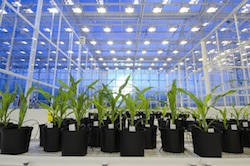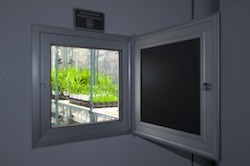Syngenta has unveiled its new crop research facility at the company’s RTP Innovation Center, located in North Carolina. The $72 million Advanced Crop Lab allows company researchers to simulate any agricultural climate and precisely measure plant inputs. This technology will help farmers grow more food with fewer resources.
 “Our new Advanced Crop Lab allows us to bring together components of all research where we can create environments for multiple crops from multiple regions — simultaneously,” said Michiel van Lookeren Campagne, head of biotechnology for Syngenta. “Individual controls of temperature, light and carbon dioxide levels, as well as humidity control in many growth chambers, provide tailored environments that allow our talented researchers to work on specific grower challenges. In addition to innovative facilities, being in RTP, we have access to some of the greatest scientific minds to help farmers grow more from less.”
“Our new Advanced Crop Lab allows us to bring together components of all research where we can create environments for multiple crops from multiple regions — simultaneously,” said Michiel van Lookeren Campagne, head of biotechnology for Syngenta. “Individual controls of temperature, light and carbon dioxide levels, as well as humidity control in many growth chambers, provide tailored environments that allow our talented researchers to work on specific grower challenges. In addition to innovative facilities, being in RTP, we have access to some of the greatest scientific minds to help farmers grow more from less.”
The research facility houses 30 climate-controlled growth environments in all-glass greenhouses. Syngenta can simulate conditions from Iowa in one room and from Africa next door. This flexibility will allow company researchers to focus on developing agricultural traits that optimize crop yields, use resources efficiently and resist various stresses that farmers face every day across the globe.
“Syngenta invests more than $1.25 billion annually to directly focus on solving challenges for farmers. As we consider global food security, the research conducted in our new crop lab will be essential to meet that demand,” said Vern Hawkins, Syngenta North America region director.
Design elements of the new facility include insulated glass walls that provide a virtually shadowless indoor environment, a liquid “fertigation” system to feed and water the plants and an automated roof-washing system. The building is Green Globes Certified, which recognizes the company’s sustainable construction processes. In constructing the new facility, Syngenta reclaimed a former industrial site and recycled more than 85 percent of those materials.

